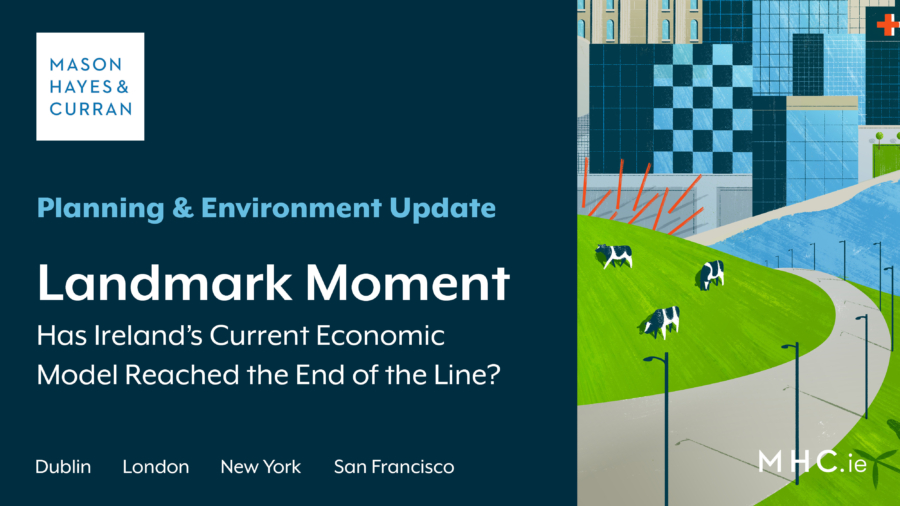
How can we achieve a circular economy in Ireland?
Our current economy operates on a linear system of taking, making, using and then throwing away products and resources. As society has found itself ever more reliant on finite resources, this approach is now recognised as unsustainable.
In March 2022, the Government published the Circular Economy, Waste Management (Amendment) and Minerals Development (Amendment) Bill 2022 (the “Bill”). The Bill has been subject to initial amendments at Committee State and identified as priority legislation for Spring / Summer 2022.
The Bill will provide for Ireland’s shift towards a circular economy model of production and consumption. This involves reusing, repairing and recycling existing materials and products as long as possible. This will in turn minimise waste, significantly reducing the State’s greenhouse gas emissions. The Bill is a significant step in Ireland’s progression under this pillar of the European Green Deal and the EU Circular Economy Action Plan. The Government has hailed its publication a “landmark moment” to making Ireland’s circular economy a reality.
The Bill builds on Ireland’s 2020 Waste Action Plan for a Circular Economy (WAPCE), the 2021 Whole of Government Circular Economy Strategy and the Circular Economy Programme. It herarlds another significant step in safeguarding the health and wellbeing of Irish citizens in the coming decades.
The Bill places the Circular Economy Strategy on a statutory footing. It provides that the Strategy shall have regard to a wide range of national and international plans and strategies. These include the WAPCE, the Climate Action Plan, National Planning Framework and Marine Planning Framework and the United Nations Sustainable Development Goals.
This will have significant effects on how businesses operate in key sectors including wholesale, retail and waste management, effectively placing the re-use of resources and reduced consumption at the centre of the Irish economy. It will also bring about meaningful changes to everyone’s consumption and use of resources.
The Circular Economy Bill - key points
So, what specifically will the consequent Act introduce? The Bill is quite wide ranging and stems across multiple areas, amending national legislation[1], and giving further effect to three EU Directives[2]. Additionally, the Bill:
- Defines the “Circular Economy” for the first time in Irish domestic law as, an economic model and the policies and practices which give effect to that model in which—
(a) goods, products and materials are kept in use for as long as possible thereby reducing the consumption of raw materials and impacts harmful to the environment,
(b) the maximum economic value is extracted from those goods, products and materials by the persons using them, and
(c) the goods, products and materials concerned are recovered and regenerated at the end of their useful life (Section 6)
- Places the Circular Economy Strategy and National Food Loss Prevention Roadmap on a statutory footing, establishing a legal requirement for governments to develop and periodically update these two policies. (Section 7, 15)
- Introduces environmental levies to incentivise the use of reusable and recyclable alternatives to a range of wasteful single-use disposable packaging and other items, for instance single use cups or containers. The Minister will prescribe the amount of the levy, for each single use item between 20 cent and one euro, and the retailer will be responsible for payment, effectively passing it on to the consumer. (Section 11, 12) Any person / business who fails to comply with this shall be guilty of an offence and liable to up to a €50,000 fine and two years in prison. (Section 13)
- Provides powers to the Minister to prohibit the supply of certain single-use items. It is envisaged that this step will pave the way for the eradication of disposable coffee cups. (Section 14)
- Provides powers for the Minister to impose a levy on waste recovery that takes place in Ireland, and also on waste exports from Ireland for recovery elsewhere in the EU and outside of the EU. (Section 28, 29)
- Establishes a Circular Economy Fund (re-designating the existing Environment Fund), which will remain ring-fenced to provide support for environmental and circular economy projects. Proceeds from the single -use and environmental levies will be ringfenced into the Fund. (Section 8)
- Introduces a mandatory segregation and incentivised charging regime for commercial waste. This is similar to what exists for the household market and will support increased recycling rates. (Section 26, 27)
- Includes measures to tackle illegal dumping and littering by providing for the use of CCTV and other recording devices for waste enforcement purposes. The Bill includes measures to ensure GDPR compliance and the protection of the privacy rights of citizens. (Sections 20 – 22)
- Streamlines national processes for End-of-Waste and By-Products applications and decisions, tackling the delays which can be encountered by industry, and supporting the availability of recycled secondary raw materials in the Irish market. (Section 30)
- Further to the Government’s Commitment to prohibit the exploration and extraction of fossil fuels under the Climate Action and Low Carbon Development (Amendment) Act 2021, the Bill introduces prohibitions on exploration for and extraction of coal, lignite and oil shale. (Section 37 – 40)
Conclusion
It is expected that the Circular Economy, Waste Management (Amendment) and Minerals Development (Amendment) Act 2022 will be brought into force later in 2022. In addition to this, the EU Commission set out its ‘Circular Economy Package’ in late March 2022. This includes the Sustainable Products Initiative (SPI), a new Construction Products Regulation and a new Directive for empowering consumers for the green transition.
Overall, these legislative steps pave the way for significant change in consumption patterns and habits. Whilst it could be argued that such changes have already started seeping into the social psyche, it is also clear that these fundamental changes are required throughout industry and society for sustainable goods, services and business models to become the norm.
For more information, contact a member of our Planning & Environment team.
The content of this article is provided for information purposes only and does not constitute legal or other advice.
[1] The Waste Management Act 1996, The Litter Management Act 1997, The Minerals Development Act 1940 and the Minerals Development Act 2017.
[2] Directive (EU) 2015/720 of the European Parliament and of the Council of 29 April2015, Directive (EU) 2019/904 of the European Parliament and of the Council of 5 June 2019 and 2008/98/EC of the European Parliament and of the Council of 19 November 2008






